新概念英语第一册课文翻译及学习笔记Lesson123
- 格式:docx
- 大小:39.02 KB
- 文档页数:5
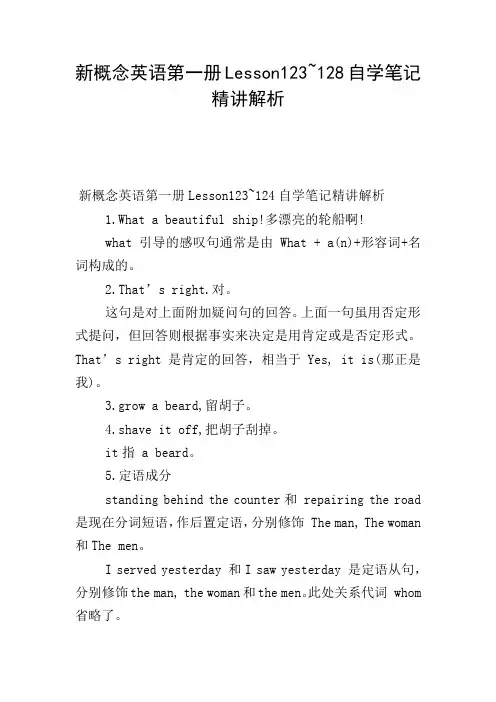
新概念英语第一册Lesson123~128自学笔记精讲解析新概念英语第一册Lesson123~124自学笔记精讲解析1.What a beautiful ship!多漂亮的轮船啊!what引导的感叹句通常是由 What + a(n)+形容词+名词构成的。
2.That’s right.对。
这句是对上面附加疑问句的回答。
上面一句虽用否定形式提问,但回答则根据事实来决定是用肯定或是否定形式。
That’s right是肯定的回答,相当于Yes, it is(那正是我)。
3.grow a beard,留胡子。
4.shave it off,把胡子刮掉。
it指 a beard。
5.定语成分standing behind the counter和 repairing the road 是现在分词短语,作后置定语,分别修饰 The man, The woman 和The men。
I served yesterday 和I saw yesterday 是定语从句,分别修饰the man, the woman和the men。
此处关系代词 whom 省略了。
I bought yesterday和I found in the garden是定语从句,分别修饰 the book, the books和 the kitten。
关系代词 which或 that 省略了。
新概念英语第一册123-124课语法知识点 Grammar in use定语从句中的省略当关系代词代表主语并且从句中的谓语动词是(现在)进行时态时,关系代词及助动词be均可省略。
如果关系代词在从句中代表宾语,则往往可以省略。
此外,定语从句可用介词结尾。
请分别看以下的例句:The woman standing behind the counter served me.站在柜台后边的那位妇女为我服务/招待了我。
This is the book I bought yesterday.这就是我昨天买的那本书。
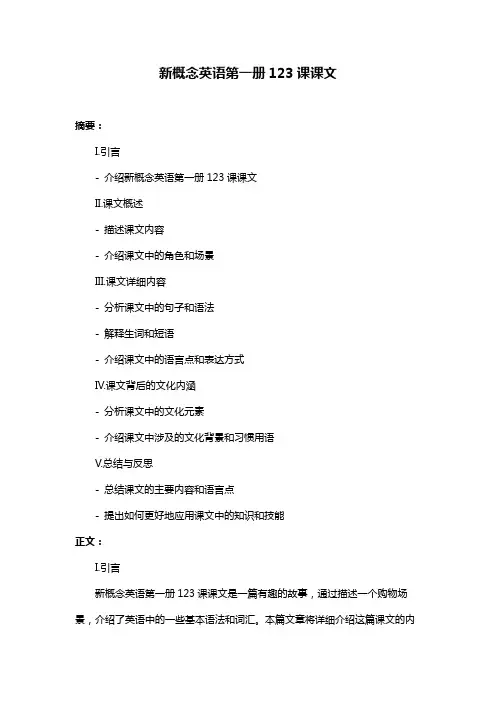
新概念英语第一册123课课文摘要:I.引言- 介绍新概念英语第一册123课课文II.课文概述- 描述课文内容- 介绍课文中的角色和场景III.课文详细内容- 分析课文中的句子和语法- 解释生词和短语- 介绍课文中的语言点和表达方式IV.课文背后的文化内涵- 分析课文中的文化元素- 介绍课文中涉及的文化背景和习惯用语V.总结与反思- 总结课文的主要内容和语言点- 提出如何更好地应用课文中的知识和技能正文:I.引言新概念英语第一册123课课文是一篇有趣的故事,通过描述一个购物场景,介绍了英语中的一些基本语法和词汇。
本篇文章将详细介绍这篇课文的内容、语言点和背后的文化内涵。
II.课文概述这篇课文讲述了一个人去商店买东西的故事。
故事中,一个人向售货员询问关于苹果和香蕉的价格,然后选择购买苹果。
在这个过程中,课文涉及了英语中的一些基本语法和词汇,如动词的一般现在时、疑问句和回答、以及一些日常购物用语。
III.课文详细内容课文中的句子和语法结构都比较简单,主要由一般现在时构成。
例如,“I like apples.”(我喜欢苹果。
)和“You like bananas.”(你喜欢香蕉。
)等。
此外,课文还涉及了一些疑问句和回答,如“How much are the apples?”(苹果多少钱?)和“They are two yuan.”(它们是两元。
)等。
课文中的角色和场景都比较简单,主要由一个人和售货员组成。
故事发生在一家商店里,描述了一个人在购买水果的过程。
IV.课文背后的文化内涵这篇课文中涉及了一些文化元素,例如购物场景、价格和货币单位等。
在英语国家,购物是一种常见的日常活动,而商店也是人们经常光顾的地方。
此外,英语中常用的货币单位是英镑和美元,而课文中使用的“yuan”则是中国人民币的单位,这也是一个有趣的文化差异。
V.总结与反思通过学习这篇课文,我们可以学到一些基本的英语语法和词汇,例如一般现在时、疑问句和回答等。
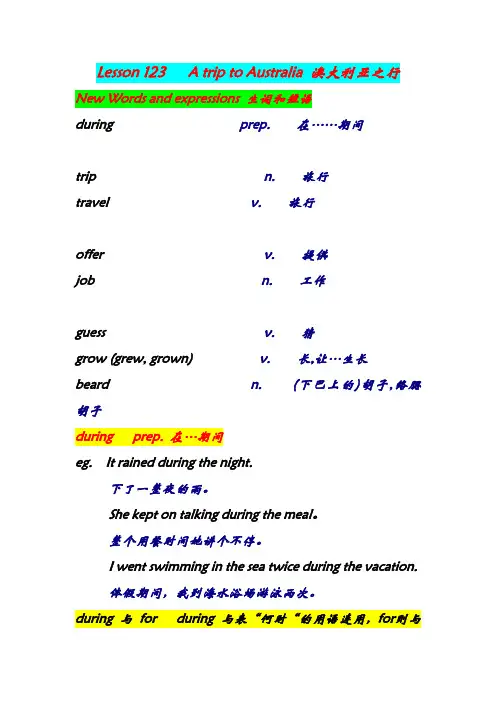
Lesson 123 A trip to Australia 澳大利亚之行New Words and expressions 生词和短语during prep. 在……期间trip n. 旅行travel v. 旅行offer v. 提供job n. 工作guess v. 猜grow (grew, grown) v. 长,让…生长beard n. (下巴上的)胡子,络腮胡子during prep. 在…期间eg. It rained during the night.下了一整夜的雨。
She kept on talking during the meal。
整个用餐时间她讲个不停。
I went swimming in the sea twice during the vacation.体假期间,我到海水浴场游泳两次。
during 与for during 与表“何时“的用语连用,for则与表”时间的长度“连用eg. I was in hospital during June.我在6月间一直住院。
I was in hospital for a month.我住院一个月。
during 与in 表示在某个时间所发生的事,during和in 二者均可用eg. We’re going on holiday during August. = We’re going on holiday in August.我们在8月要去度假。
trip n./ v.1) n. 旅行a bus trip 汽车旅行a business trip 出差go on a trip 出去旅行take a honey moon trip to Hawaii 到夏威夷蜜月旅行eg. My father will make a trip to New York next week.父亲下礼拜要到纽约去。
take a trip 观光旅行(美)make a trip 商务或办事的旅行(美)go on a trip=make a trip=take a trip 去旅行arrange a trip = organize a trip = plan a trip 计划旅行a fielf trip 实地考察a round trip 往返旅行make a side trip to (旅途中)顺路a sightseeing trip 观光旅行a trip to school 上学a trip to the office 上班a trip of the tongue 失言2)v. 绊倒trip over 被…绊倒eg. She tripped over the carpet and fell.她被地毯绊倒。
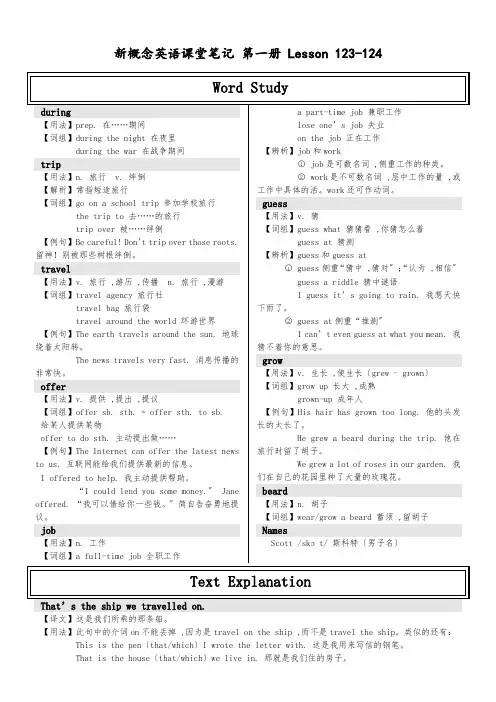
新概念英语课堂笔记第一册 Lesson 123-124【译文】这是我们所乘的那条船。
【用法】此句中的介词on不能丢掉 ,因为是travel on the ship ,而不是travel the ship。
类似的还有: This is the pen〔that/which〕I wrote the letter with. 这是我用来写信的钢笔。
That is the house〔that/which〕we live in. 那就是我们住的房子。
What a beautiful ship!【译文】多漂亮的轮船啊!【用法】此句为what引导的感慨句 ,其句型有以下三者种:○1 What + a + adj. + 可数名词单数 + 主 + 系!○2 What + adj. + 可数名词复数 + 主 + 系!○3 What + adj. + 不可数名词 + 主 + 系!e.g. What an interesting book it is!What interesting books they are!What clean water it is!How引导的感慨句句型有:○1 How + adj. + 主 + 系!○2 How + adv. + 主 + 谓!e.g. How interesting the book is!How hard he works!Remember?【译文】还记得吗?【用法】本句是一个省略说法 ,完整说法为:Do you remember?The one who offered you a job in Australia.【译文】就是在澳大利亚给你工作做的那个人。
【用法】one 是代词 ,指man。
It’s not you, is it? That’s right.【译文】这不是你 ,对吗?不 ,是我。
【用法】○1第一句为反义疑问句。
此句中的代词it指代身份不明确的人。
例如:Who is knocking? 是谁? It’s me! 是我!It’s the postman. 是邮差。



新概念英语第⼀册123-124课课⽂重难点 further notes on the text1.what a beautiful ship!多漂亮的轮船啊!what引导的感叹句通常是由 what + a(n)+形容词+名词构成的。
2.that's right.对。
这句是对上⾯附加疑问句的回答。
上⾯⼀句虽⽤否定形式提问,但回答则根据事实来决定是⽤肯定或是否定形式。
that's right 是肯定的回答,相当于yes, it is(那正是我)。
3.grow a beard,留胡⼦。
4.shave it off,把胡⼦刮掉。
it指 a beard。
5.定语成分standing behind the counter和 repairing the road是现在分词短语,作后置定语,分别修饰 the man, the woman和the men。
i served yesterday 和i saw yesterday 是定语从句,分别修饰the man, the woman和the men。
此处关系代词 whom省略了。
i bought yesterday和i found in the garden是定语从句,分别修饰 the book, the books和 the kitten。
关系代词 which或 that 省略了。
新概念英语第⼀册123-124课语法知识点 grammar in use定语从句中的省略当关系代词代表主语并且从句中的谓语动词是(现在)进⾏时态时,关系代词及助动词be均可省略。
如果关系代词在从句中代表宾语,则往往可以省略。
此外,定语从句可⽤介词结尾。
请分别看以下的例句:the woman standing behind the counter served me.站在柜台后边的那位妇⼥为我服务/招待了我。
this is the book i bought yesterday.这就是我昨天买的那本书。
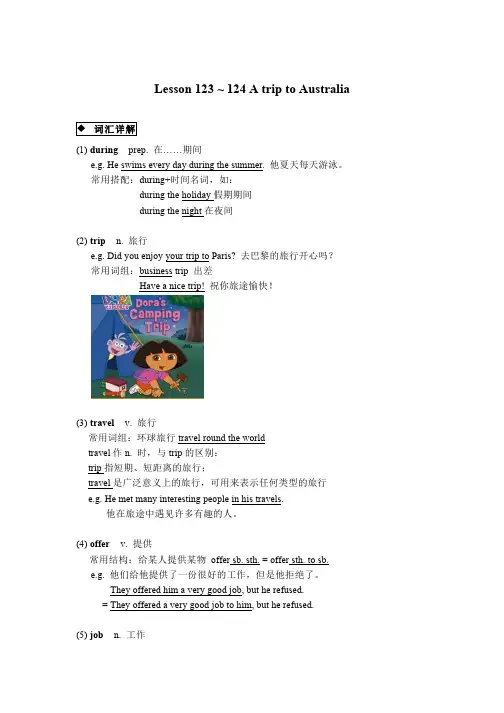
Lesson 123 ~ 124 A trip to Australia!词汇详解(1) during prep. 在……期间e.g. He swims every day during the summer. 他夏天每天游泳。
常用搭配:during+时间名词,如:during the holiday假期期间during the night在夜间(2) trip n. 旅行e.g. Did you enjoy your trip to Paris? 去巴黎的旅行开心吗?常用词组:business trip 出差Have a nice trip! 祝你旅途愉快!(3) travel v. 旅行常用词组:环球旅行travel round the worldtravel作n. 时,与trip的区别:trip指短期、短距离的旅行;travel是广泛意义上的旅行,可用来表示任何类型的旅行e.g. He met many interesting people in his travels.他在旅途中遇见许多有趣的人。
(4) offer v. 提供常用结构:给某人提供某物offer sb. sth. = offer sth. to sb.e.g. 他们给他提供了一份很好的工作,但是他拒绝了。
They offered him a very good job, but he refused.= They offered a very good job to him, but he refused.(5) job n. 工作e.g. What’s your favourite job? 你最喜欢的工作是什么?辨析:job与work1) job是指一份固定的工作或职业,是可数名词。
e.g. My job is a keyboard operator. 我的工作是一名键盘操作员。
2) work是指劳动,work是不可数名词。

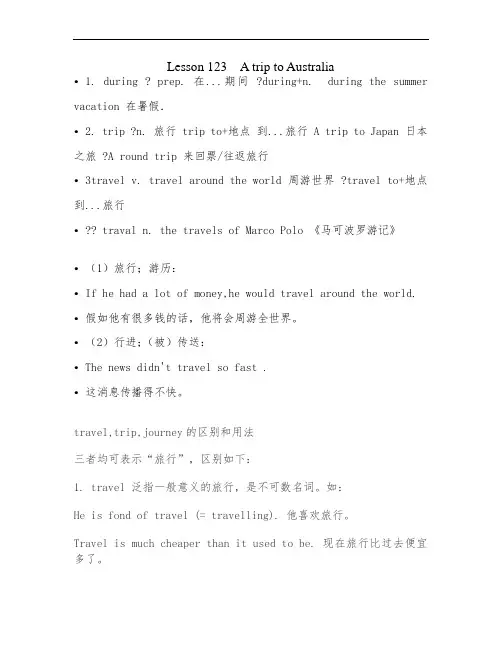
Lesson 123 A trip to Australia•1. during ? prep. 在...期间 ?during+n. during the summer vacation 在暑假.•2. trip ?n. 旅行 trip to+地点到...旅行 A trip to Japan 日本之旅 ?A round trip 来回票/往返旅行•3travel v. travel around the world 周游世界 ?travel to+地点到...旅行•?? traval n. the travels of Marco Polo 《马可波罗游记》•(1)旅行;游历:•If he had a lot of money,he would travel around the world.•假如他有很多钱的话,他将会周游全世界。
•(2)行进;(被)传送:•The news didn't travel so fast .•这消息传播得不快。
travel,trip,journey的区别和用法三者均可表示“旅行”,区别如下:1. travel 泛指一般意义的旅行,是不可数名词。
如:He is fond of travel (= travelling). 他喜欢旅行。
Travel is much cheaper than it used to be. 现在旅行比过去便宜多了。
注:有时可用复数形式,主要指时间较长的各处旅行,此时通常有物主代词修饰,但是尽管用了复数形式,却不能与 many 或数词连用。
如:He’s gone off on his travels again. 他又外出旅行了。
另外,travel 通常只是泛指旅行,而不特指某次具体的旅行,所以通常不说:How was your travel2. journey 通常指远距离的陆地旅行,并且不一定要返回到出发地(即通常指单程)。
如:I wish you a pleasant journey. 祝你一路顺风。

Lesson 123-124 A trip to Australia 澳大利亚之行Key words[词汇]during prep. 在…期间trip n. 旅行travel v. 旅行offer v. 提供job n. 工作guess v. 猜grow(grew/grown) v. 长,让…生长beard n.(下巴上的)胡子,络腮胡子kitten n. 小猫★during prep. 在…期间I went swimming in the sea twice during the vacation. 休假期间,我到海水浴场游两次泳。
词义辨析:during ,forduring与表“何时”的用与连用,for则与表“时间长度”的词连用。
如:I was in hospital during June. 我六月间一直在住院。
People suffered food shortages during the war. 人们在战争期间受食品短缺之苦。
I was in hospital for a month. 我住院一个月。
表示在某个时间将要发生的事,during和in二者可互换。
如:We’re going on holiday during/in August. 我们在八月要去度假。
★trip n. 旅行My father will make a trip to New York next week. 父亲下礼拜要到纽约去。
Tony and Susan will take a honeymoon trip to Hawaii. 托尼和苏珊要到夏威夷蜜月旅行。
固定短语搭配:a bus trip汽车旅行;a business trip出差;a field trip实地考察;a round trip往返旅行;make a side trip to(旅途中)顺路去;a sightseeing trip观光旅行★travel v. 旅行①v. 旅行;游历He said that if he had a lot of money he would travel around the world.②v. 行进;(被)传送Light travels faster than sound.The news didn’t travel as fast as we had expected.这消息传播得不如我们所预料得那样快。
Lesson 1 Excuse me! 课文1 对不起!1。
Excuse me!对不起2。
Yes?什么事?3。
Is this your handbag?这是您的手提包吗?4. Pardon?对不起,请再说一遍。
5。
Is this your handbag?这是您的手提包吗?6。
Yes, it is。
是的,是我的。
7. Thank you very much.非常感谢!Lesson 3 Sorry, sir。
$课文3 对不起,先生。
8。
My coat and my umbrella please。
请把我的大衣和伞拿给我.9。
Here is my ticket.这是我(寄存东西)的牌子.10。
Thank you, sir。
谢谢,先生。
11。
Number five。
是5号.12. Here's your umbrella and your coat.这是您的伞和大衣13. This is not my umbrella。
这不是我的伞。
14。
Sorry sir。
对不起,先生.15。
Is this your umbrella?这把伞是您的吗?16. No, it isn't.不,不是!17。
Is this it?这把是吗?18。
Yes, it is.是,是这把19. Thank you very much。
非常感谢.Lesson 5 Nice to meet you $课文5 很高兴见到你。
20。
Good morning。
早上好。
21. Good morning, Mr。
Blake。
早上好,布莱克先生。
22. This is Miss Sophie Dupont。
这位是索菲娅。
杜邦小姐.23. Sophie is a new student.索菲娅是个新学生。
24. She is French。
她是法国人.25。
Sophie, this is Hans.索菲娅,这位是汉斯.26。
新概念英语第一册课文翻译及学习笔记Lesson123【课文】MIKE:Look, Scott. This is a photograph I took during my trip to Australia.SCOT:T Let me see it, Mike.SCOT:T This is a good photograph. Who are thesepeople?MIKE:They're people I met during the trip.MIKE:That's the ship we travelled on.SCOT:T What a beautiful ship!SCOT:T Who's this?MIKE:That's the man I told you about.Remember?SCOT:T Ah yes. The one who offered you a job in Australia.MIKE:That's right.SCOT:T Who's this?MIKE:Guess!SCOT:T It's not you, is it?MIKE:That's right.MIKE:I grew a beard during the trip, but I shaved it off when I came home.SCOT:T Why did you shave it off?MIKE:My wife didn't like it!【课文翻译】迈克:看,这是我到澳大利来旅行时拍的一张照片。
斯科特:让我看看,迈克。
斯科特:这是一张很好的照片。
这些人是谁。
迈克:他们是我旅行时理解的人。
迈克:这是我们所乘的那条船。
斯科特:多漂亮的船啊!斯科特:这是谁?迈克:这就是我跟你说过的那个人。
还记得吗?斯科特:啊,记得。
新概念英语第一册第123课单词:澳大利亚之行during ['djr] prep.在……期间【单词例句】A: She always peddles gossip and does nothing during office hours.A:她上班时间总是说闲话,什么事情也不做。
B: Maybe she hasn't got anything to do.B:也许她没什么可干的。
trip [trp] 旅行【单词例句】A: I'd like to join a bus trip.Could you recommend some places for me?A.我想要参加巴士旅行。
能够推荐一些地方给我吗?B: If tlus is your frst time to come here, I'Il say that our City Tour should be your frst choice。
B:如果您是第一次来这儿,那么我认为我们的城市之旅将是您的第一选择。
travel ['træv()l] 旅行【派生词】traveling旅行的traveler旅行者【单词搭配】travel by air乘飞机旅行 travel agency旅行社【单词例句】A: I want to travel to South Africa. Would you please tell me something about it?A:我想到南非旅行。
你能告诉我一些关于那儿的情况吗?B: Sure. There are many different kinds of wild :u:umals, Most of them only appear in Affica.B:当然能够。
那儿有很多不同种类的野生动物,其中绝大部分只有非洲才有。
offer ['f] v提供【单词例句】A: Would you please give me a valuation form?A:你们能给我一个估价单吗?B:Yes, we're glad to offer you free valuation forms.B:是的,我们很乐意为您提供免费的估价单。
新概念英语第一册课文翻译及学习笔记Lesson123【课文】
MIKE: Look, Scott. This is a photograph I took during my trip to Australia.
SCOTT: Let me see it, Mike.
SCOTT: This is a good photograph. Who are these people?
MIKE: They're people I met during the trip.
MIKE: That's the ship we travelled on.
SCOTT: What a beautiful ship!
SCOTT: Who's this?
MIKE: That's the man I told you about.Remember?
SCOTT: Ah yes. The one who offered you a job in Australia.
MIKE: That's right.
SCOTT: Who's this?
MIKE: Guess!
SCOTT: It's not you, is it?
MIKE: That's right.
MIKE: I grew a beard during the trip, but I shaved it off when I came home.
SCOTT: Why did you shave it off?
MIKE: My wife didn't like it!
【课文翻译】
迈克:看,这是我到澳大利来旅行时拍的一张照片。
斯科特:让我看看,迈克。
斯科特:这是一张很好的照片。
这些人是谁。
迈克:他们是我旅行时理解的人。
迈克:这是我们所乘的那条船。
斯科特:多漂亮的船啊!
斯科特:这是谁?
迈克:这就是我跟你说过的那个人。
还记得吗?
斯科特:啊,记得。
就是在澳大利亚给你工作的那个人。
迈克:对。
斯科特:这是谁?
迈克:你猜!
斯科特:这不是你,对吗?
迈克:不,是我。
迈克:我在旅行时留了胡子,但我回到家时就把它刮了。
斯科特:你为什么把它刮了?
迈克:我妻子不喜欢!
【生词】
during prep.在……期间
trip n. 旅行
travel v. 旅行
offer v. 提供
job n. 工作
guess v. 猜
grow (grew, grown) v. 长,让……生长
beard n. (下巴上的)胡子,络腮胡子
二【知识点讲解】
(一)单词扩展
1. during prep. 在...期间 during+n. during the summer vacation 在暑假
2. trip n. 旅行 trip to+地点到...旅行 A trip to Japan
日本之旅 A round trip 来回票/往返旅行
3. grow (grew grown) v. 成长,生长 growth n. 成长
grow up 长大,变成熟/理智起来;mushroom growth 雨后春笋般
地增长,迅速增长
Lady Gaga's fans increased as quickly as mushroom growth. Lady Gaga的粉丝如雨后春笋般迅速增长。
4. traval v. 旅行(常指长途旅行) travel around the world
周游世界 travel to+地点到...旅行
traval n. the travels of Marco Polo 《马可波罗游记》
5. offer v.(主动)提供 May I offer you a drink? 我能够请
你喝一杯吗?
offer n. a job offer 一个工作机会经常在毕业的时候,同学们都会互相询问:"Have you got the offer yet?" 找到工作没
有?(有公司要你了吗?)
6. beard n. 胡须(络腮胡子)mustache n.小胡子(八字胡)
beard v.对抗,顶撞
【谚语】beard the lion/lair in his den 老虎头上拔毛/太岁头上动土。
7. job n.工作 work n./v. job只能做名词,而work既能够做动词,也能够做动词
a part-time jo
b 兼职; do a good job 干得好,干得漂亮
失业: lose one's job/ out of work
(二)语法讲解【手把手教你玩转定语从句 (二)】
【定语从句】
上一期,我们初步接触了定语从句,以及that,which, who等引导词的使用。
1. 上期回顾:当先行词在定语从句中充当主语或宾语时,由that(物&人),which(物), who(人)等引导词来引导定语从句,先行词在定语从句中作宾语时,引导词能够省略。
如 she is the girl (that/who) I like. 但充当主语时,则不能省略,She is the girl that/who offered me a drink yesterday.(不能省略)
2. 先行词的特殊用法:
根据第1点,似乎that这个先行词是放之四海而皆准,确实,that还有着自己的优越性,在下面几种情况下,引导词只能用that,而不能用别的先行词:
a. 当先行词为 all, much, little, few, none, something, anything, everything, nothing 等不定代词时。
All that can be done has been done.
b. 当先行词既指人又指物时。
He spoke of the men and the thing (that) he had seen abroad.
c. 当先行词被序数词或形容词的级修饰时。
This is one of the best films that I have ever seen.
d. 当先行词被 the very, the only, the last, any, every 等修饰时。
This is one of the very book that I am looking for.
e. 当先行词是疑问词 who, what, which 时。
Who that has such a home doesn’t love it?
f. 关系代词在从句中作表语。
Mary is no longer the girl that she used to be.
(ps:表语就是放在be动词,或者是系动词(感官动词:see,smell,taste,touch,feel,sound等跟人的感官相关系的词,以及表示变化的词,如go,turn等)
以上五种情况,只能由that作为引导词来引导定语从句。